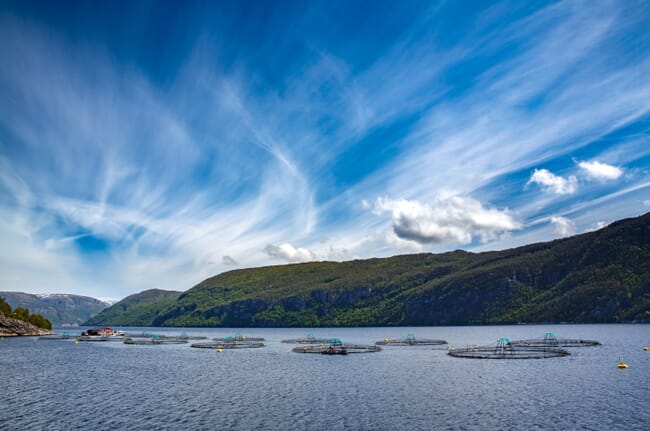
Recommendations for a streamlined licensing system and payouts to those communities which have salmon farms are among the highlights of the first stage of an ambitious review by Prof Russell Griggs, which has been completed this week.
The results could lead to the closure of some inshore fish farms, while there is likely to be scope for producers to increase the biomass consent for offshore fish farms to over the 2,500 tonnes to which they are currently limited.
Despite the salmon farming sector’s huge contribution to the rural economy – where it provides over 2,500 jobs and generates billion in revenues – it has long been a devise subject and the report bore this out. Prof Griggs, who is no stranger to reviewing industries, noted that he had never seen the level of “mistrust, dislike and vitriol at both an institutional and personal level between the industry, certain regulators, parts of Scottish government and other stakeholders.”
Despite – or perhaps because of – such findings, the Scottish Government has accepted all its recommendations in principle. These include:
- The introduction of a new single licencing payment, based on the tonnage of production at a site, which covers the cost of all organisations involved in the process and adds value to local communities.
- The Scottish Government should produce, within 12 months, a 10-year framework for each part of the aquaculture sector – finfish, shellfish and seaweed – within which all must operate. Those that are found wanting may be forced to close.
In a press release, rural affairs secretary Mairi Gougeon said: “This is a comprehensive piece of work by Professor Griggs and I am very grateful to him for the significant amount of time and effort that has gone into delivering it.
“Aquaculture is a significant contributor to our rural economy, providing well paid jobs in some of Scotland’s most fragile communities and will be an essential part of our green recovery and transition to net zero.
“It is important that change to the sector is delivered in a practical way that reflects the co-operation agreement with the Scottish Green Party and our own manifesto commitments.
“Developing world-leading legislation for aquaculture is key to developing a sector that is both environmentally and economically sustainable."
Professor Griggs said: “It has been a fascinating and interesting review from many standpoints and I would like to thank the organisations and individuals who took part in this process for their frank and open contributions.
“It is clear that while there is a broad range of views on aquaculture there is also a lot of commonality in certain aspects so it is an industry which faces significant opportunities as well as challenges.
“I firmly believe that this process I am recommending will deliver a regulatory landscape that promotes a thriving environmentally and economically sustainable sector based on the best knowledge we have on all issues at that time.”
Next steps
In his summary, Griggs said the government will shortly produce its own Vision for Aquaculture in Scotland, and that an aquaculture framework should be developed from that.
He added that once the framework is in place, only the Cabinet Secretary should have the power to sanction change.
“Different bodies within national and local government, regulators, and other associated bodies will be responsible for implementing the framework to ensure they are delivered. They do so as implementers only,” wrote Griggs.
Salmon Scotland, the industry trade body, has welcomed the review’s findings.


